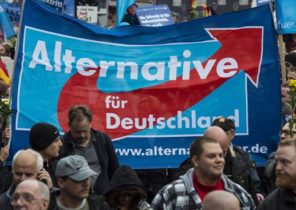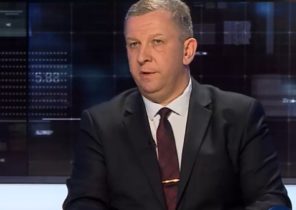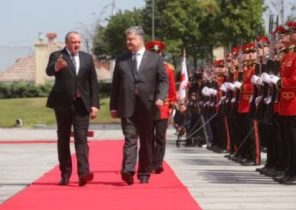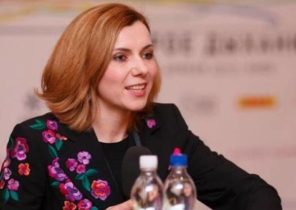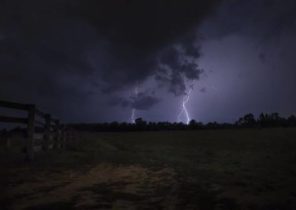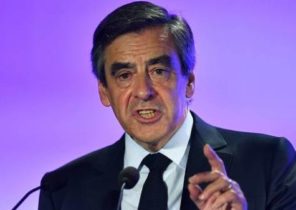People in Russia celebrate the victory over Nazi Germany 8 may, and a day later. The unconditional surrender was signed in Berlin at a time when Moscow was already midnight. The celebration of may 9 for the Kremlin’s political tool.
Vladimir Putin posing as the defender of the memory of Soviet victory, historians debate give him for this all new reasons. Alexei Miller, the Director of the Center for the study of cultural memory and symbolic politics at the European University of St. Petersburg, said that it is important to understand how we got to the current situation.
“Süddeutsche Zeitung”: Why the memory of victory in world war II in Russia is given more weight than in the US, France or the UK?
Alexey Miller: If we compare the number of dead in this war, there and here, enormous differences become apparent. The grief caused by the Nazi invasion of the Soviet Union, unbelievable. But there is another reason: victory plays the role of the fundamental myth of Russian society, and this is extremely important. In the republics of the Russian Federation there are many ethnic groups that have differences in historical memory. But on may 9 they can come together and celebrate the victory.
— What do you mean by a foundational myth?
— Every country has a myth of Central importance for historical memory. For the United States is probably its independence from Britain, to France — revolution and so on. For the Soviet Union in such a myth was, among other things, the 1917 revolution, but in today’s Russia it no longer plays any role. The only event that can serve as a fundamental myth, it is the Great Patriotic war and victory in it.
Some accuse Europe that it does not recognize the contribution of Russia to the end of the Second world war. Do you share this opinion?
— Yes, I think so too. But more importantly, so says the Russian society. We see the organized desire in Europe to belittle the contribution of Russia to victory. This policy follows the line specified by such EU members as Poland and the Baltic countries. It’s not ignorance, but deliberate policy. I think that our relations with Western Europe it will be of great value.
— Putin at every opportunity, blames the West that denigrates Russia.
— On the one hand it is. On the other hand, we must note that here we are talking about really important things. In the twentieth century, the Nazi regime was considered absolute evil, and the Holocaust was the absolute crime, that was the narrative. Now we have a new narrative, which suggests that there are two absolute evil — the Nazis and the Soviet regime. The role of the Soviet Union as the country that stopped the Holocaust, is no longer recognised. This issue has great symbolic value.
— How is it manifested?
— There is an original ethnicity of victims and Russification of criminals. Example: if you describe rape of German women during the war, did the Soviets or Russians. If it comes about the liberation of Auschwitz, then, the Soviet army was not Russian, but Ukrainians, as it was the soldiers of the 1st Ukrainian front. No one explains that these military units were named in the directions of their attacks, and not on the ground, where he was educated.
Putin is enough to call the statements of European politicians about the liberation of Auschwitz, according to which Auschwitz was liberated by the allied forces and the Red army is not even mentioned. He brings such to the attention of the population and asks: do I have to explain to you that these people are the Russophobes? For Russian citizens this victory is Holy. They listen to it and think: Yes, we have the same opinion.
I know that German politicians clearly believe the merit of the liberation of Auschwitz by the red Army.
— Yes, but, for example, Ursula von der Leyen, President of the European Commission, signed a joint statement with the presidents of the Council of Europe and European Parliament, beginning with the words, that the allies liberated the concentration camp of Auschwitz-Birkenau.
— You said that Russian society feels that his victory has been put down. Maybe it is to inspire from the top?
I was one of the first who explained to the Russian society, which means European Parliament resolution of September 2019. This resolution describes the Soviet Union and Germany as the equivalent of two vicious totalitarian regime, which alone is responsible for the war and all her crimes. Only Russia, according to the resolution, should draw conclusions from his past, to fulfill their “homework”. But my reaction to it is different from the official line. The official line is that We are in a state of war memories and need to defend their point of view. I say: we are at war, but even in the war memoirs need to think about how to make peace.
— How would you finish this war?
— First of all, we must admit that not all of the West thinks so. We, along with the European countries should live as good neighbours. Putin is too fixated on confrontation. Perhaps not even Putin himself, and the people who carry out the policy. Politics revolves around conflict, the memory must also help these conflicts to overcome. But now the situation is different, as in Europe, and Russia: memory became a space for conflict, that is just a continuation of the policy.
— Putin may 9 uses for political purposes. Don’t hand him this historical dispute?
— It helps him to use may 9 for political purposes. But he wants to use that date for political purposes, it is not entirely clear. In terms of the politics of history, Putin is a opportunist. If someone abroad sees as a possible partner, he always signals his willingness to seek common ground. Case in point: when in 2009 Tusk invited him to Westerplatte, Putin said there that it is impossible to be proud of the Molotov-Ribbentrop Pact. Tusk said at the time that the Soviet Union liberated Poland from the Nazis, but could not bring her freedom, because he was not free. Putin was delighted with this formulation. Probably, and now he’s committed to a kind of reconciliation: during his speech at the memorial of Yad Vashem in January, he suggested that the members of the UN security Council discussed how the Second world war. He was clearly hoping that many heads of States will arrive in Moscow on may 9. But the virus prevented.
— In January in St. Petersburg, Putin said that he wants “to shut the mouth” falsifiers of history, you don’t sound very apologetic. He was sure that the Russians want to hear this?
When Putin found out about the resolution of the European Parliament probably in October, he realized that this is a serious challenge. And politicians from Western Europe voted for this resolution and nobody in Europe criticized it. Then he decided that he too needs a strong provocation. And it really worked. It caused a wave of terrible speeches and articles in Poland, extremely aggressive, extremely Russophobic. Putin has achieved its goal: if the Europeans were allowed Poland to speak on their behalf, they subscribed to an extremely biased position.
— Is the Russian position is not the same biased?
— Of course. But it is also important to ask how we came to this point. The Russian position initially was to consider the Soviet past as a shared tragic experience of all the people in the Soviet Union. But it wasn’t what you wanted, the new independent Russia’s neighbors. Russia has condemned the secret Protocol of the Molotov-Ribbentrop Pact in 1989, and the occupation of the Baltic States in 1940. But immediately after that, Latvia and Estonia said that all who came to these countries after the annexation by the Soviet Union, will not receive citizenship, it had to do with their children. Another example: everyone remembers how Willy Brandt knelt down in Warsaw. But does anyone remember how Putin got on his knees before the monument in Katyn?
— Where the NKVD in 1940 has executed more than 4,000 Polish prisoners of war officers.
— No one remembers Putin knelt down. Because no one is interested. What I want to say: Russia did not immediately react to this new approach to history.
— You say that others have started with this historical policy. Why?
— Think this strategy from the beginning originated in Eastern Europe, especially Ukraine and the Baltic countries. After the liberation from the Soviet Union, they were in an uncomfortable position, because many local individuals who fought in the war against the Soviets, actively participated in the Holocaust. But if the Holocaust is the main evil, then there must be a reckoning. Their strategy was to explain to Western Europeans: we fought against two totalitarian regimes, therefore, have towards you of moral capital. In addition, we observed an exceptional rise of this trend after 2014, after the conflict in Ukraine and annexation of Crimea.
— Whether the founding myth, you were talking about in the beginning, part of the problem that Eastern Europeans the end of the Soviet Union in 1991 meant the liberation, but the majority of Russians regard him today as a defeat?
In a sense, Yes, the conflict started then. But the Russian was ready to consider 1991 as a victory. And as the release. But this would mean that they lost the cold war. Along with all the other people they had gotten the victory over communism. They wanted to become part of the civilized world, as it was called Gorbachev that would be a kind of membership in EU or NATO. Prior to 1994 may to 1995, the Russian elite desperately wanted this membership. But it turned out that no it is not going to take. In addition, GDP then fell by 40 percent and remained at this level for ten years. Swept the country a wave of suicides and murders caused by this economic downturn. Try to imagine a Russian in 1991 as a victory would take them for idiots.
